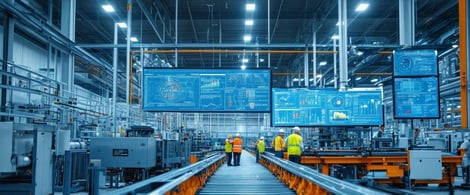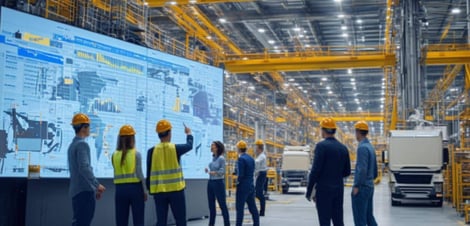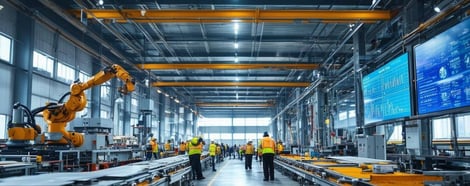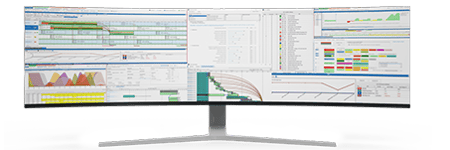
Building Resilience into Production Schedules in Industrial Manufacturing
Industrial manufacturing plants face an array of challenges that test their ability to maintain efficient production schedules. Disruptions from global supply chain fluctuations, labor shortages, material price volatility, and unexpected equipment downtime have made it essential for plant managers to prioritize resilience in their operations. Building resilience into production schedules isn’t just a reactive measure—it’s a strategic approach to ensuring long-term sustainability and competitiveness.
One of the most effective ways to enhance scheduling resilience is by integrating advanced production scheduling systems, such as PlanetTogether, with enterprise resource planning (ERP) systems like SAP, Oracle, Microsoft Dynamics, Kinaxis, or Aveva. This integration enables a seamless flow of data, enhancing decision-making and agility.
Let’s explore how Plant Managers in industrial manufacturing facilities can build resilience into their production schedules and leverage integrated solutions to stay ahead.

The Importance of Resilient Production Schedules
Resilience in production schedules ensures that your plant can withstand, adapt to, and recover from disruptions. A resilient schedule not only minimizes downtime but also helps optimize resource utilization and meet customer demands despite challenges.
Key benefits of resilient production schedules include:
Flexibility to Handle Disruptions: Enables quick adjustments in case of unexpected events like material shortages or machine breakdowns.
Improved Customer Satisfaction: Ensures on-time delivery despite potential delays.
Cost Optimization: Reduces the financial impact of disruptions by preventing waste and improving efficiency.
Long-term Competitiveness: Builds trust with stakeholders, from suppliers to customers, by demonstrating reliability.

Challenges to Resilient Scheduling in Industrial Manufacturing
Complex Supply Chains: Globalized supply chains are highly susceptible to delays and disruptions.
Demand Volatility: Fluctuations in customer demand can make it difficult to plan production accurately.
Operational Silos: Lack of collaboration between departments can lead to inefficiencies and misaligned priorities.
Limited Visibility: Outdated systems often fail to provide real-time data, leading to reactive rather than proactive decision-making.
Resource Constraints: Labor shortages and equipment limitations often impede the ability to adapt quickly.


Building Resilience Through Technology Integration
Integrating PlanetTogether with ERP systems like SAP, Oracle, Microsoft Dynamics, Kinaxis, or Aveva is a game-changer for building resilient production schedules. This powerful combination provides real-time data visibility, predictive analytics, and automation, enabling plant managers to make informed decisions faster and more effectively.
Real-Time Data Synchronization
Integration ensures seamless data flow between systems, offering a unified view of operations. For example:
SAP provides comprehensive data on inventory levels, procurement, and order fulfillment.
PlanetTogether uses this data to create optimized production schedules that align with real-time demand and resource availability.
This real-time synchronization allows for immediate adjustments to production schedules in response to supply chain delays or equipment downtime.
Scenario Planning and Simulation
Resilience requires the ability to anticipate and plan for potential disruptions. By leveraging PlanetTogether’s simulation capabilities, integrated with Kinaxis’ demand planning tools, plant managers can:
Evaluate the impact of various "what-if" scenarios, such as supplier delays or labor shortages.
Identify the best course of action to minimize disruption and maintain output.
This proactive approach minimizes the guesswork, reducing risks and improving outcomes.
Enhanced Collaboration and Communication
Disjointed communication between departments often hampers resilience. Integration with platforms like Microsoft Dynamics enables:
Improved collaboration by centralizing information across production, procurement, and logistics teams.
Automated notifications and updates, ensuring that stakeholders are informed of schedule changes in real time.
This enhanced communication fosters a more cohesive response to disruptions.
Predictive Maintenance and Resource Optimization
Machine breakdowns are a significant cause of unplanned downtime. By integrating PlanetTogether with Aveva’s predictive maintenance tools, plant managers can:
Monitor equipment performance and schedule maintenance proactively.
Adjust production schedules based on maintenance needs without disrupting overall output.
This not only reduces downtime but also extends the lifespan of critical assets.
AI-Driven Decision Support
When combined with Oracle’s advanced analytics capabilities, PlanetTogether provides actionable insights for decision-making. For example:
AI algorithms analyze historical data to identify patterns and predict potential disruptions.
These insights enable plant managers to take preemptive action, such as securing alternative suppliers or reallocating resources.
The industrial manufacturing landscape is evolving rapidly, and resilience is no longer optional—it’s essential. By integrating tools like PlanetTogether with ERP systems such as SAP, Oracle, Microsoft Dynamics, Kinaxis, or Aveva, plant managers can build robust production schedules that withstand disruptions and drive efficiency.
Resilient scheduling is not just about surviving challenges; it’s about thriving in an unpredictable world. By embracing technology and fostering a culture of adaptability, your facility can achieve sustained success and remain competitive in the years to come.
Are you ready to take your manufacturing operations to the next level? Contact us today to learn more about how PlanetTogether can help you achieve your goals and drive success in your industry.